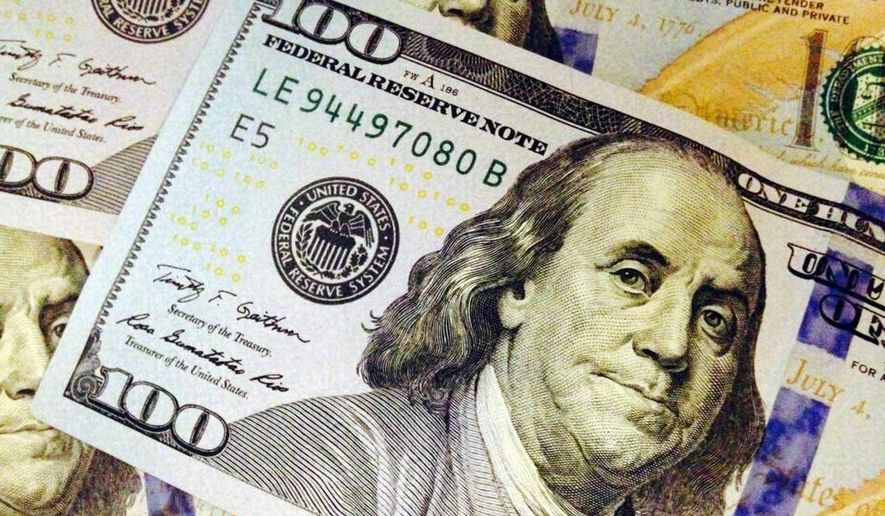Nuke Bizzle never had much choice but to grab as much pandemic cash as he could steal, according to his version of events.
Bizzle, the rap name of Fontrell Baines, is now pleading for leniency from a federal judge who will decide how much more of his life he will spend behind bars.
“I never had a birthday party. I never had a normal family dinner. I have never been to a wedding, only funerals and court dates,” Baines told a judge in a memo ahead of his Dec. 7 sentencing.
His fraud was cocky, to say the least.
He recorded himself sending off stacks of bogus unemployment applications and then posted the footage of his crime on YouTube as a rap video titled “EDD,” after California’s jobs agency.
“Unemployment so sweet,” he sang, while his rap partner, Fat Wizza, intoned: “You gotta sell cocaine, I can just file a claim.”
It was the biggest hit of Nuke Bizzle’s career, and Baines said he had record deals “on the table.” He blew up so big that Fox News’ Tucker Carlson took notice. Mr. Carlson devoted part of his Sept. 22 show to Nuke’s video and called it emblematic of the government’s bungling of pandemic unemployment claims.
A day later, Baines was stopped by police in Las Vegas and was found with unemployment benefit payment cards in others’ names. Less than a month later, the feds went to arrest him on fraud charges and found him with a Glock .357 pistol. That netted him another charge because, as a repeat felon, he was not supposed to possess a firearm.
“My kids love that song and I hate it because they don’t even know what EDD is,” he told the judge in the case in a personal letter asking for leniency. “This has been the worst two years of my life.”
Prosecutors say the false unemployment cases Baines handled totaled nearly $1.3 million in potential benefits. More than $700,000 was paid out to his address before the scam came crashing down.
Baines is far from alone.
The federal government paid out roughly $800 billion in pandemic unemployment benefits, and a colossal amount was stolen. One expert has told The Washington Times that fraudsters likely siphoned off more than $200 billion.
Some of those were international crime syndicates, but independent actors in the U.S. — from postal workers to prison inmates — also saw dollar signs in the generosity of taxpayers.
Baines said he never intended to be a part of that. He told the judge that he agreed to let his address be used by friends scamming the system and would turn over the mail to them in exchange for cash payments.
When he discovered how much money was passing through his hands in the form of unemployment benefit charge cards, he “felt played” by his friends.
“I started just taking the cards myself and telling them they never made it,” he said.
“It was hard to resist the money that I could get from the cards especially when everybody around was doing it,” he said.
His attorney said Baines ended up with far less than the more than $700,000 that prosecutors attributed to him.
It’s tough to square that version with the rap video of Baines, which shows him handling stacks of application letters. Investigators managed to decipher a return address on one of the pieces of mail Baines was flashing and found that a bogus claim had been submitted in that name just days before the video was posted.
Baines said he became involved in rap as an escape from a rough home life. He was born to a mother in jail, was brought up by an aunt who was addicted to crack cocaine, began to look after his four younger brothers by age 10, and was seduced by a babysitter a couple of years later.
He gambled for money, got caught up in a gang dust-up in 2008 and got shot in the leg, his attorney said. Baines didn’t have health insurance, and his attorney said he was patched up “superficially” and pushed onto the street with an opiate prescription that fueled an ongoing drug addiction.
It also sent him to Las Vegas, where he began rapping with some success.
Then came the “EDD” video.
“I made a rap video about it because the rap industry has a tendency in it to glorify crime and I got caught up in that, but another thing that rappers rap a lot about is prison and now I’m caught up in that too,” he told the judge.
Nuke Bizzle’s video had more than 400,000 views on YouTube at the time Baines was arrested.
The video is still available on other channels, including one for co-performer Fat Wizza, where it has 236,000 views.
Prosecutors asked U.S. District Judge Michael W. Fitzgerald to impose a 96-month sentence, which would cover not only the pandemic fraud but also gun and drug charges. They also want the judge to order Baines to repay $704,760.
Baines’ attorney said he has been in jail since his arrest and has already suffered under near-total COVID-19 lockdown. He missed his aunt’s death — his family “told him she died of a nervous breakdown after hearing about his arrest” — and he has been away from his five children, ages 3 to 12.
The lawyer has asked the judge for a 70-month sentence.
For more information, visit The Washington Times COVID-19 resource page.
• Stephen Dinan can be reached at sdinan@washingtontimes.com.




Please read our comment policy before commenting.